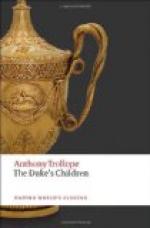There was a meeting of the subscribers to the hunt in the last week of October. At that meeting Major Tifto told his story. There he was, to answer any charge which might be brought against him. If he had made money by losing the race,—where was it and whence had it come? Was it not clear that a conspiracy might have been made without his knowledge;—and clear also that the real conspirators had levanted? He had not levanted! The hounds were his own. He had undertaken to hunt the country for this season, and they had undertaken to pay him a certain sum of money. He should expect and demand that sum of money. If they chose to make any other arrangement for the year following they could do so. then he sat down and the meeting was adjourned,—the secretary having declared that he would not act in that capacity any longer, nor collect the funds. A farmer had also asserted that he and his friends had resolved that Major Tifto should not ride over their fields. On the next day the Major had his hounds out, and some of the London men, with a few of the neighbours, joined him. Gates were locked, but the hounds ran, and those who chose to ride managed to follow them. There are men who will stick to their sport though Apollyon himself should carry the horn. Who cares whether the lady who fills a theatre be or be not a moral young woman, or whether the bandmaster who keeps such excellent time in a ball has or has not paid is debts? There were men of this sort who supported Major Tifto;—but then there was a general opinion that the Runnymede hunt would come to an end unless a new master could be found.
Then in the first week of November a special meeting was called at the Beargarden, at which Lord Silverbridge was asked to attend. ’It is impossible that he should be allowed to remain in the club.’ This was said to Lord Silverbridge by Mr Lupton. ’Either he must go or the club must be broken up.’
Silverbridge was very unhappy on the occasion. He had at last been reasoned into believing that the horse had been the victim of foul play; but he persisted in saying that there was no conclusive evidence against Tifto. The matter was argued with him. Tifto had laid bets against the horse; Tifto had been hand and glove with Green; Tifto could not have been absent from the horse above two minutes; the thing could not have been arranged without Tifto. As he had brought Tifto into the club, and had been his partner on the turf, it was his business to look into the matter. ’But for all that,’ said he, ’I’m not going to jump on a man when he’s down, unless I feel sure that he is guilty.’
Then the meeting was held, and Tifto himself appeared. When the accusation was made by Mr Lupton, who proposed that he should be expelled, he burst into tears. The whole story was repeated,—the nail, the hammer, and the lameness; and the moments were counted up, and poor Tifto’s bets and friendship with Green were made apparent,—and the case was submitted to the club. An old gentleman who had been connected with the turf all his life, and who would not have scrupled, by square betting, to rob his dearest friend of his last shilling, seconded the proposition,—telling all the story over again. Then Major Tifto was asked whether he wished to say anything.




